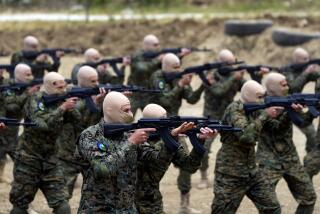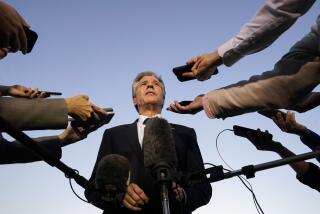Arabs Fear Regional Jolt of Iraq War
- Share via
RIYADH, Saudi Arabia — Arab leaders are unanimously opposed to an American invasion of Iraq because they are afraid it will lead to greater instability and violence across an already crisis-plagued region, according to Western diplomats, Arab officials and political observers.
The Arab community has tried to persuade Washington to cool down its war talk, insisting that an attack against Iraq would be an attack on the whole “Arab nation.” And it has leaned on Baghdad to let U.N. weapons inspectors back in, hoping that the move would make an invasion less likely.
For the record:
12:00 a.m. Oct. 4, 2002 For The Record
Los Angeles Times Friday October 04, 2002 Home Edition Main News Part A Page 2 National Desk 5 inches; 192 words Type of Material: Correction
Northern Iraq--A Sept. 16 story in Section A stated that the northern part of Iraq is not predominantly populated by Muslims of the Sunni sect. In fact, the area is a stronghold for Kurds, who are mostly Sunni Muslim but not Arab.
But both approaches have so far proved unsuccessful--and that is making many people here uneasy.
“They are very, very concerned about the fallout from American military action,” said a Western diplomat based here who spoke on condition he not be identified. “They see it happening against the backdrop of unparalleled anti-American sentiment that has already put pressure on moderate regimes. They are very worried.”
But a regional calculus is also taking place, as leaders try to figure out how to balance their need to maintain public order with their desire not to completely alienate the White House. Although the leaderships’ public posture remains one of solidarity with the people of Iraq, there are signs that some are trying to hedge their bets.
In the Persian Gulf region, for example, every government has publicly objected to an invasion, but several have allowed U.S. military forces to make war preparations on their soil. And on Sunday, the Saudi foreign minister, Prince Saud al Faisal, told CNN that if the United Nations authorized a strike on Iraq, the Saudis would be “obliged to follow through” if the United States needed bases in the kingdom.
According to the Western diplomat here, the Saudis “recognize [Washington is] probably going to do it this way.... When it comes down to it, they don’t want to be left on the sidelines looking irrelevant.”
Still, the region is already in turmoil. Many people are angry at the United States because they believe that it used the Sept. 11 terrorist attacks as an excuse to advance its self-interest. They are angry because of what they see as America’s one-sided support for Israel. An attack on Iraq now, many fear, would make everything worse. The country could break apart. The Arab “street” might rise up. A cornered Saddam Hussein could hurl chemical or biological weapons into neighboring nations.
Each country in the region also has its individual concerns. Saudi Arabia fears that an attack on Iraq would complicate its desire to maintain ties with Washington and would undermine the war against terrorism. Jordan worries that it would be overrun by refugees and lose its supply of cheap oil. Egypt is worried that its people would take to the streets in demonstrations that could turn against the regime. And Iran, largely Muslim although not Arab, is not too keen on having a pro-American regime on its border.
There is one anxiety, however, that touches moderate and hard-line governments alike: the fear that post-Hussein Iraq would be even more dangerous, more volatile than it is now. The anxiety is magnified because in Hussein’s Iraq there are no independent government institutions to speak of and no obvious opposition group waiting in the wings to assume power.
“Who will run things?” said a top government official from the region who asked not to be identified. “The military? There will be a coup every week. All these people of the opposition will not stand one day in Iraq. They have no credibility in Iraq. They have no political or tribal depth in Iraq.”
The worry that Iraq will unravel is a result of both the country’s religious and ethnic makeup. Hussein and his allies belong to the main branch of Islam, the Sunni sect. Although Sunnis make up the vast majority of the world’s Muslims, they are a minority in Iraq. The bulk of the population is Shiite Muslims, a sect that broke off from the majority in a dispute over who would succeed the prophet Muhammad as caliph.
In addition, southern Iraq is the location of two of the Shiites’ holiest shrines.
That has people in Saudi Arabia, the birthplace of Islam, anxious. Neighboring Iran, the only country in the region controlled by Shiites, has a track record of trying to export its revolution and its fiery brand of Islam.
Conservative Islamic regimes in the Persian Gulf have looked to Hussein’s ironfisted government, if nothing else, as a bulwark against Shiite aspirations.
If Hussein’s regime collapses and the U.S. fails to fill the power vacuum quickly, there is concern that Iran might try to encourage Iraq’s Shiite-dominated south either to break off as an independent country or to merge with Iran. Saudi Arabia, the most conservative of Islamic countries, is not eager to have a Shiite neighbor on its border.
“This is no doubt a big concern,” said Saleh ibn Humaid, chairman of the Shura Council, an appointed advisory board in the kingdom. “It is a worry for the whole world.”
Iraq’s religious makeup, however, is only one aspect of the nation’s fragile composition. The northern section of the country also is not Sunni. But it is not Arab either. It is a stronghold for Kurds. Since the end of the 1991 Persian Gulf War, the Kurds have in effect had autonomy in the region, with U.S. and British warplanes enforcing a “no-fly” zone overhead and the United Nations administering funds brought in under Iraq’s U.N.-authorized “oil-for-food” program.
Although the Kurds have insisted that they are not interested in declaring independence, there is considerable concern about them among nations in the region already contending with separatist Kurdish populations of their own. Those countries are as diverse as Turkey, a member of the North Atlantic Treaty Organization, and Syria, which the United States considers a state sponsor of terrorism.
Above all, these regional anxieties are magnified by the Palestinian-Israeli conflict.
The Arab leadership is unanimous in its conviction that the conflict is the region’s foremost problem and should be tackled before any other. Western diplomats based here, and Western expatriates who work here, confirm that. But it is a reality that Washington appears to have ignored, many here say.
“Out here, people think Americans willfully or otherwise ignore their single most important grievance,” said a Western ambassador based in the region. “And in Washington, they like to tune that grievance out a bit ... which really de-legitimizes what is a legitimate point of view.”
For this reason, although Arab leaders say they would not shed a tear if Hussein’s regime fell, they say the United States has picked the worst possible time to force the issue.
In Saudi Arabia, that feeling is magnified by the perception that Americans have blamed the entire country for the Sept. 11 attacks.
Arab leaders are concerned about maintaining public calm. Taken together, poor economic conditions, high unemployment and a young population pose a potential crisis to regimes either so old that they are considered by many of their own subjects to be out of touch, or so young that they have not been able to solidify power.
“I have seen the street in action a lot. The governments here in this area are capable of controlling it before it gets out of hand,” the Western ambassador said.
“Part of the price of controlling that is they will do and say things [the U.S.] will not like.”
There are signs that the crackdown has already begun. In Egypt, for example, a military court last week sentenced 51 Islamists to lengthy prison terms, and other suspected Islamists have been arrested--moves that at least one security analyst called preparations for an American invasion.
More to Read
Sign up for Essential California
The most important California stories and recommendations in your inbox every morning.
You may occasionally receive promotional content from the Los Angeles Times.










